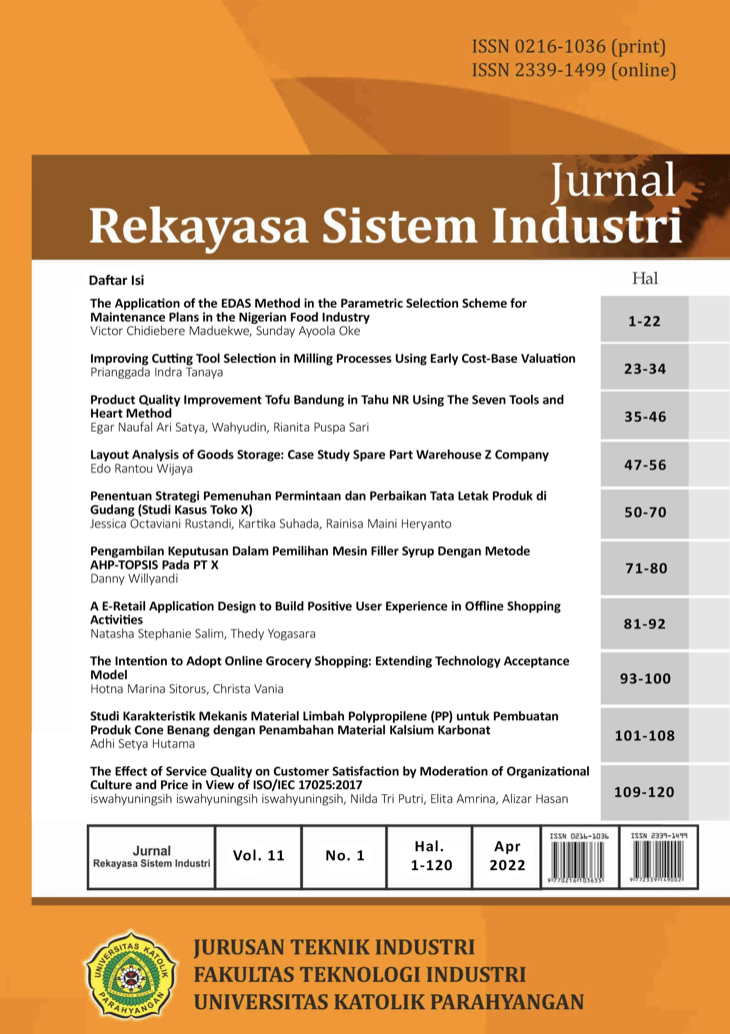Studi Karakteristik Mekanis Material Limbah Polypropilene (PP) untuk Pembuatan Produk Cone Benang dengan Penambahan Material Kalsium Karbonat
DOI:
https://doi.org/10.26593/jrsi.v11i1.5288.101-108Keywords:
recycle program, recycle polypropilene, yarn cone, flexural test, mass weightAbstract
Based on data from SIPSN (Sistem Informasi Pengolahan Sampah Nasional) Ministry of Environment and Forestry, Indonesia's waste stockpile in 2020 reached 33 million tons, and 17.12% of it was plastic waste. The government has several alternative solutions in waste management, such as the creation of a waste bank, compost house, maximizing the 3R (reduce, reuse, and recycle) program, and applied plastic waste for renewable energy. Research on the use of PP plastic waste for the manufacture of recycled yarn cones is also included in the use of the 3R program which is being discussed by the government. The aim of this research is to obtain the mechanical characteristics (flexural strength) and mass weight between the cones made from recycled PP and pure PP. Based on the observations that have been made, the cone product with PP material has a compressive strength characteristic of 0.4 – 0.8 kg/mm2 and a weight of 10.5 – 11.5 grams. The study of the use of PP plastic waste to be used as a cone product begins with preliminary research related to optimizing product manufacturing parameters on injection machines. The next step process is making cone products with added calcium material. After the product has been printed, the next step is flexural testing and measurement of the mass of the product. Based on the test results, the product of pure PP cone material with 5% and 10% calcium carbonate added, and recycled PP material with 15% calcium carbonate addition is the result that meets the mass standard (10.5 g to 11.5 g) and flexural strength. (0.4 kg/mm2 to 0.8 kg/mm2). Because the focus of research is on the use of plastic waste, so the ideal cone product is recycled PP material with the addition of 15% calcium carbonate.
References
Data Timbunan Sampah Indonesia Tahun 2020, [Online], Diakses dari: https://sipsn.menlhk.go.id/sipsn/public/data/timbulan [2021, 4 Oktober].
Surono, U. B. (2013). Berbagai Metode Konversi Sampah Plastik Menjadi Bahan Bakar Minyak. Jurnal Teknik, 3(1), 32-40.
Purwaningrum, P. (2016). Upaya Mengurangi Timbulan Sampah Plastik Di Lingkungan. Jurnal Teknik Lingkungan, 8(2), 141-147.
Surono, U. B., & Ismanto. (2016). Pengolahan Sampah Plastik Jenis PP, PET Dan PE Menjadi Bahan Bakar Minyak dan Karakteristiknya. Jurnal Mekanika dan Sistem Termal, 1(1), 32-37.
Amanda, P., Fratika, I. S., Burhani, S. D. A., & Masruchin, N. (2019). Pemanfaatan Limbah Plastik Komersial Polipropena (PP) untuk Biokomposit dengan Penambahan Serat Alam. Prosiding Seminar Lignoselulosa, 65-72.
Widyatmoko, H., Purwaningrum, P., & Febrina, P. A. P. (2016). Analisis Karakteristik Sampah Plastik di Permukiman Kecamatan Tebet dan Alternatif Pengolahannya. Jurnal Teknik Lingkungan, 7(1), 24-33.
Sahwan, F. L., Djoko, H. M., Sri, W., & Lies, A. W. (2005). Sistem Pengelolaan Limbah Plastik Di Indonesia. Jurnal Teknik Lingkungan. P3TL-BPPT, 6(1), 2311-318
Juniarto, A. (2018). Pemanfaatan Limbah Plastik Polipropilen Sebagai Material Komposit Plastik Biodegradable dengan Penambahan Serbuk Ampas Aren. Skripsi Teknik Mesin, Universitas Muhammadiah Surakarta. Surakarta.
Hayu, W. S. (2021). Optimasi Parameter Injection Molding untuk Mengurangi Cycle Time dan Berat Produk Cone Benang dengan Metode Taguchi. Tugas Akhir Perancangan Manufaktur, Politeknik ATMI. Surakarta
Hutama, A. S. (2015). Optimasi Pembuatan Biokeramik dengan Struktur Pori-pori Beraturan. Thesis. Universitas Gadjah Mada. Yogyakarta
Laksana, A. H., & Waluyo, M. B. (2021). Effect Pengaruh Komposisi Serat Kenaf dan Serbuk CaCO3 Terhadap Kekuatan Tekuk dan Water Absorption Komposit Hybrid-Poliester. Indonesian Journal of Mechanical Engineering Vocational, 1 (2), 58-64.
Khamid, A. (2011). Rancang Bangun Alat Uji Bending dan Hasil Pengujian untuk Bahan Besi Cor. Tugas Akhir Diploma III Teknik Mesin. Universitas Diponegoro. Semarang
Mawardi, I., Hasrin, & Hanif. Analisis Kualitas Produk dengan Pengaturan Parameter Temperatur Injeksi Material Plastik Polypropylene (PP) pada Proses Injection Molding. Malikussaleh Industrial Engineering Journal, 4(2), 30-35.

